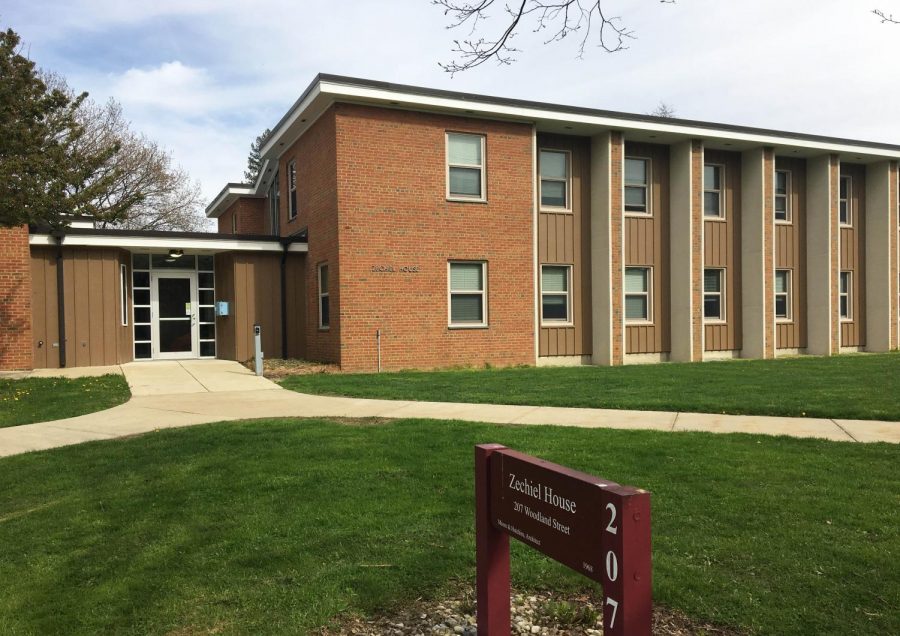Residential Education To Reorganize Dorm Arrangements
Zechiel House will transition into a first-year residence hall in fall 2019.
The Office of Residential Education is planning to introduce a series of changes to the nature of living spaces over the next five years in hopes of increasing programming, faculty integration, and feelings of community. As of next year, Zechiel House will become a First-Year Residential Experience dorm, Barnard House will hold the Sci-Fi themed halls currently located in North Hall, and Noah Hall will be a designated substance-free and quiet space which was previously located in Barnard.
During this time of transition, ResEd is also faced with other uncertainties — the office is in the midst of searching for a new ResEd director, and a search committee was formed earlier this year.
“Our goal is to maximize opportunities to integrate the academic and residential experience,” wrote Assistant Vice President of Student Life Adrian Bautista in an email to the Review. “We’d like to expand faculty/academic department connections to our living spaces, remodel educational spaces in our housing facilities, create new programmatic events [that] enhance a sense of community, and maximize peer leadership opportunities.”
To achieve these outcomes, ResEd hopes to expand program house offerings and continue to support efforts to learn and live collaboratively.
“A goal is to expand these [program house] connections as we believe faculty, staff and student engagement should be a cornerstone of all our residential facilities,” Bautista wrote. “Student Life recently received a grant from NASPA, a national student affairs organization, for programming in the remodeled Third World House classroom called Obie Xing. Obie Xing is a collaborative learning space that brings together faculty, staff, and students to enhance student success through programs sponsored by such offices as the Career Development Center and Student Academic Success Programs with significant faculty participation.”
College junior and Lord House Resident Assistant Daquan Williams noted the impact the program housing model, and faculty integration into housing, has had on Afrikan Heritage House residents.
“I think that things that happen in The House really benefit students, hosting programs that really get at how to navigate Oberlin and how living in a space can inform that,” he said. “The House is currently connected to Africana Studies; we work together. It’s really beneficial that you get to cultivate relationships with professors in the departments that the house is connected with — to really embody a learning, living space.”
These changes will be enacted in hopes of carrying out some of the goals, called Directions for the Future, presented in the Oberlin College Strategic Plan 2016–2021, and will be coupled with modifications to dining and other areas of student life.
“[The plan details ways in which Oberlin can] develop the residential experience to ensure that it serves as an intellectual and artistic incubator for educational excellence,” wrote Bautista. “Such excellence requires an integrated plan that reimagines sequenced living experiences, dynamic dining practices, and more opportunities for intimate peer circles that enhance meaningful connections where students can further develop their sense of belonging, and engage one another across differences.”
However, some RAs are concerned that attempts to expand program housing may lose sight of why program housing originated.
“Program housing right now is mostly POC and low-income,” Barnard Hall RA and College junior Ariana Gladieux-Carter said. “It’s typically been associated with activism. Houses pop up in response to what’s going on. A-House came about for civil rights, and to have a space for Black students on campus. … There is already that sense of community amongst POC and low-income students so expanding on community is possible, but I think it’s hard to navigate the narrative of program housing when it has inherently been for POC and people with a lower socio-economic status in general.”
Others feel that the reorganization could make program housing more difficult to navigate.
“I’ve lived in Latinx Hall all three that I’ve been at Oberlin and it has been a cornerstone of support as I’ve navigated campus,” College junior Eder Aguilar. “However, is is difficult to build community when you’re constantly being moved or being treated like a theme instead of an identity. Despite all this, we will continue to persist and will continue to grow.”
Many students are also confused as to why Zechiel, which houses 45 students, was chosen to become a first-year dorm. As of next year, the dorm will remain in the ZEBRA cluster, along with Burton, Langston, and Noah, but will be in collaboration with the First Year Residential Experience cluster.
“[Zechiel] is too far from everything,” said College junior and Zechiel RA Jasmine Sorrells. “It’s all singles, [first-years] aren’t going to meet each other, they won’t talk to each other, they won’t be involved in first-year events. … I am personally incredibly frustrated by these changes because they do not make any sense.”
ResEd is hopeful that this transition will help foster long-lasting connections between students that will continue developing after they move out of residential buildings.
“One goal with programming will be to help residential communities develop unique traditions and “signature” programs that will enhance a sense of community and long-term bonds amongst Obies,” Bautista wrote. “We want the residential experience to be more intentional, to more comprehensively reflect Oberlin’s core principles.”
Housing selection information has already been updated to reflect these changes to living spaces.







